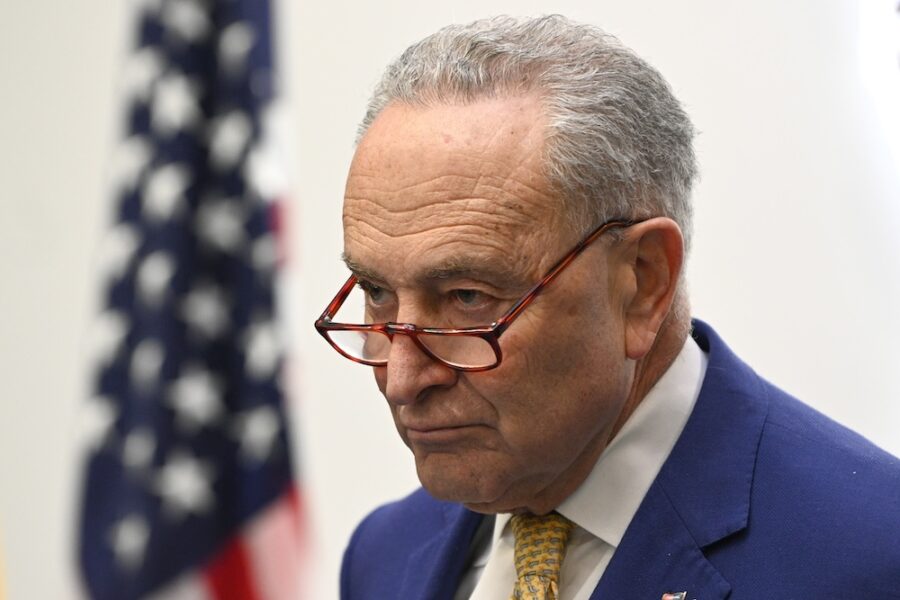Politics
Manchin, Sinema Backstab Chuck Schumer, Tank Democrats’ Last-Ditch Power Grab

Senators Joe Manchin of (I-WV) and Kyrsten Sinema (I-AZ) voted against Joe Biden’s nominee for the National Labor Relations Board (NLRB), blocking the party’s last opportunity to maintain a majority on the board until at least 2026 in a move that delivered a final blow to Democrats’ labor agenda.
The Senate vote, which failed 49-50, came as a surprise to many within Democratic leadership, who had hoped to secure a solid majority on the five-member board before the transition to the new Congress and incoming Republican administration. With President-elect Donald Trump set to take office in January, the rejection effectively opens the door for his administration to nominate a conservative replacement for the seat.
The NLRB, an independent agency tasked with overseeing union elections and adjudicating labor disputes, has been a central battleground in recent years, with its decisions shaping the direction of labor rights and union power in the United States. The loss of a Democratic majority on the board represents a significant setback for organized labor groups, which have relied on the board to counterbalance a series of legal and economic challenges.
Senators Manchin and Sinema, who both declared themselves independents after departing the Democratic Party, once again played the role of decisive swing votes. Both are set to leave Congress in January, but their final weeks in office have continued to frustrate their former party. The two lawmakers have, in previous years, drawn sharp criticism for their opposition to other Democratic priorities, such as filibuster reform and voting rights legislation.
Following the unsuccessful cloture vote, Schumer expressed his frustration, stating, “It is deeply disappointing, a direct attack on working people, and incredibly troubling that this highly qualified nominee — with a proven track record of protecting worker rights — did not have the votes.”
The seat in question was held by Lauren McFerran, a Biden appointee and the current chair of the NLRB. With her term ending, Democrats hoped to confirm her for another term and solidify a majority. Instead, her departure leaves the board split, giving Republicans an opportunity to tilt its decisions toward business interests in the coming years.
Following the vote, Manchin conveyed his reasons to the Daily Caller: “Under Chairman McFerran’s leadership, the NLRB passed and sought to implement a joint employer rule that would have imposed unnecessary regulations jeopardizing thousands of small businesses, their employees, and the communities they serve,” he stated. “I came to the U.S. Senate to empower small businesses to do what they do best, create jobs and grow our economy, and that’s why I voted against her nomination.”
After the vote, Sen. Bill Cassidy (R-LA) said, “This NLRB seat should be filled by President Trump and the new incoming Senate. Not a historically unpopular president and a Senate Democrat Majority that has lost its mandate to govern.”
I am glad the Senate rejected Democrats’ partisan attempt to deny President Trump the opportunity to choose his own NLRB nominees and enact a pro-America, pro-worker agenda with the mandate he has from the American people.
— U.S. Senator Bill Cassidy, M.D. (@SenBillCassidy) December 11, 2024
A person with knowledge of the situation told Fox News that Vice President-elect JD Vance flew to Washington D.C. from Mar-a-Lago on Wednesday morning with the intent to vote against confirming McFerran. With her confirmation blocked, the appointment to fill the position is now up to President Trump.
With Democrats now unable to reclaim the NLRB’s majority before January, attention will turn to the incoming administration and its priorities for reshaping labor policy. For Manchin and Sinema, the vote may serve as one of their final major acts in the Senate, cementing their reputations as unpredictable figures whose willingness to buck party leadership has often reshaped Washington’s political dynamics. Both senators have insisted their decisions reflect an obligation to represent all sides of the debate, even as critics argue that their positions have undercut their own party’s legislative achievements.

